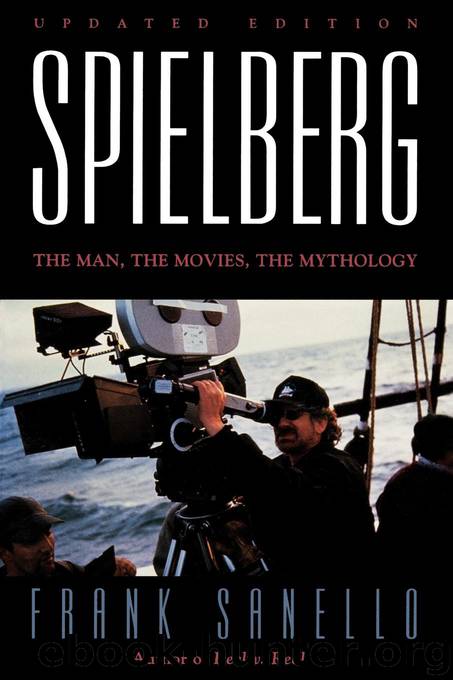Spielberg by Frank Sanello

Author:Frank Sanello
Language: eng
Format: epub
Publisher: Taylor Trade Publishing
Published: 2002-10-15T16:00:00+00:00
CHAPTER TWELVE
Not So Amazing
Stories
STEVEN SPIELBERG HAD BEGUN HIS CAREER behind the camera as a teenager. When he returned to the medium sixteen years later, he was the king of features, and his return to the small screen was expected to be a triumph.
After all, how hard could television be to tame after he had wrestled such technical big budget films to the ground? Television was slumming, and Spielberg was expected to bring a little class to the much put-upon medium.
Spielberg was wooed back to television by an unprecedented offer. NBC was willing to give him $1 million per half-hour episode and an on-air commitment to run the show for two years. That was a $50 million gamble by the network. By contrast, the hit sitcom Cheers cost only $350,000 per episode at the time. Even if the series flopped, NBC would be forced to run every single episode, slowly twisting in the wind of low Nielsens for an agonizing two seasons. More understandably, the network gave him full creative control without any interference from the suits. It also promised not to monitor his dailies. In fact, the only bureaucratic entity the all-powerful filmmaker would have to answer to was the network’s standards and practices department, i.e., the network censor. As if the king of PG entertainment needed a moral watchdog!
The network also committed to Spielberg’s vision without seeing a pilot, another unprecedented concession, like buying a car before it even made it off the drawing board, much less the assembly line.
But Spielberg had a sterling track record: director of the number-one hit of all time. And in 1985, he had produced the number-one hit of the year, Back to the Future.
NBC felt he could do no wrong. Or as NBC’s head of programming, Brandon Tartikoff, said slyly, “Steven Spielberg is an 800-pound gorilla,” and we all know such a gorilla is allowed to sit anywhere he wants.
The director was not above pooh-poohing the medium that had given him his first big break. In a rather Olympian manner, he pronounced, “A feature film is a full exercise program, and Amazing Stories is like a quick hundred push-ups. It’s just a great way to keep in shape.” (Prophetically, Spielberg had once admitted he could not do a single chin-up.)
Universal’s parent company, MCA, would produce the show. Delirious executives at the studio described the show as a “weekly series of the ordinary meets the extraordinary.”
When the alliance between Spielberg and NBC was first announced in 1984, Tartikoff predicted, “I would expect it to be a show with a lot of fun, great adventure and imagination, with nice touches of comedy where called for. I don’t expect it to be aimed at a juvenile audience,” he said, with his eye planted firmly on the audience most coveted by advertisers, eighteen- to forty-nine-year-olds. “I think younger kids will enjoy the show, but I think it will be a general-audience-pleasing show, in the same way that a lot of Steven Spielberg’s movies appeal to a broad spectrum of the movie audience.
Download
This site does not store any files on its server. We only index and link to content provided by other sites. Please contact the content providers to delete copyright contents if any and email us, we'll remove relevant links or contents immediately.
| Actors & Entertainers | Artists, Architects & Photographers |
| Authors | Composers & Musicians |
| Dancers | Movie Directors |
| Television Performers | Theatre |
Cecilia; Or, Memoirs of an Heiress — Volume 2 by Fanny Burney(31933)
Cecilia; Or, Memoirs of an Heiress — Volume 3 by Fanny Burney(31923)
Fanny Burney by Claire Harman(26590)
We're Going to Need More Wine by Gabrielle Union(19028)
Plagued by Fire by Paul Hendrickson(17396)
All the Missing Girls by Megan Miranda(15915)
Cat's cradle by Kurt Vonnegut(15320)
Bombshells: Glamour Girls of a Lifetime by Sullivan Steve(14045)
For the Love of Europe by Rick Steves(13844)
Leonardo da Vinci by Walter Isaacson(13302)
4 3 2 1: A Novel by Paul Auster(12362)
The remains of the day by Kazuo Ishiguro(8961)
Adultolescence by Gabbie Hanna(8908)
Note to Self by Connor Franta(7662)
Diary of a Player by Brad Paisley(7542)
Giovanni's Room by James Baldwin(7313)
What Does This Button Do? by Bruce Dickinson(6193)
Ego Is the Enemy by Ryan Holiday(5406)
Born a Crime by Trevor Noah(5367)
